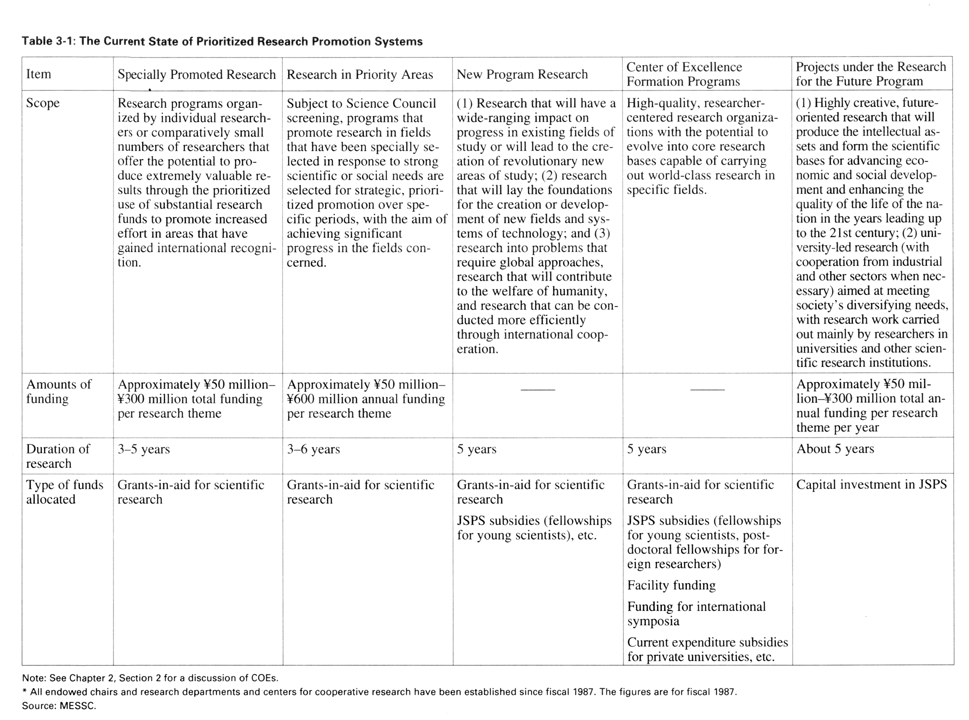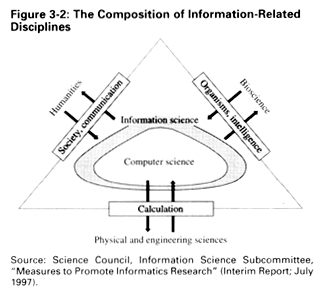| Home > Policy > White Paper, Notice, Announcement > White Paper > JAPANESE GOVERNMENT POLICES IN EDUCATION, SCIENCE, SPORTS AND CULTURE 1997 > Scientific Research Chapter 3 Section 1 3 | ||
The basic requirements when using prioritized research promotion systems are to monitor research trends and standards accurately, to take note of views from various sources, especially researchers, and to develop effective strategies. It is also important to select research fields and themes that deserve prioritized promotion. These are not easy tasks, and deliberation by the Science Council and other forums indicates that the following factors need to be considered:
These diverse perspectives are indicative of the need for prioritized promotion of research in fields like global environmental science, informatics, brain research, and infectious diseases. MESSC intends to give urgent attention to the promotion of research in the fields of global environmental science and informatics as discussed in sections (2) and (3) below. In these fields, too, a comprehensive approach that also encompasses the humanities and social sciences is needed, and as discussed in section (4), the promotion of scientific research in the humanities and social sciences will also be a priority in the future.
MESSC needs to ensure that research fields for prioritized promotion are selected appropriately. In this regard it will be important to monitor the current research situation, including research trends in Japan and abroad, and research funding in various fields. To ensure an appropriate response to the wishes of all concerned, especially researchers, it will also be necessary to expand and enhance the functions of the Science Council, which has traditionally been responsible for this task. A new prioritized research promotion system will need to be created on the basis of deliberations by the. Science Council.
Solving global environmental problems is an urgent task with crucial implications for human survival. We need to re-examine the way people live and to understand the natural environment on which our lives are based. This will require the integration of scientific research across fields ranging from the humanities and social sciences to the natural sciences and the creation of a new science of the global environment.
In April 1995 the Science Council produced a proposal entitled "The Promotion of Global Environmental Science." It called for considering the establishment of a core research organization for global environmental science to promote comprehensive joint research aimed at solving global environmental problems.
Numerous researchers in a wide range of fields subsequently studied this proposal. In March 1997 they produced a report on "The Role of a Core Research Organization in Relation to Global Environmental Science," summarized in items (a) through (c) below.
In accordance with this proposal and the report, MESSC will undertake further detailed studies and work toward the establishment of a core research organization. It will also promote global environmental science in cooperation with the relevant government ministries and agencies.

(a) Current progress in research relating to global environmental problems
: Researchers in various fields, including earth science, ecology, the humanities and social sciences, engineering, and agricultural science, are taking a keen interest in the highly topical issue of global environmental problems and are accumulating research findings that will contribute to the explanation and solution of these problems.
Japan's efforts in these areas, however, do not always compare favorably with the work being done in European and North American countries. Past research has been limited to the traditional boundaries between disciplines, and exchange and cooperation among different fields have been insufficient.
(b) The need for global environmental science
: By explaining the mechanisms behind change in the global environment, clarifying the interaction between human activity and the global environment, and re-examining the roles of social systems and human lifestyles, scientific research focusing on global environmental problems aims to create new cultural patterns that will enable people to live in harmony with nature.
In addition to the research that is already being carried out in fields relating to the global environment, it will be necessary to apply new ideas and perspectives to efforts that center on explaining the real nature of global environmental problems and on using this knowledge to solve them. As quickly as possible, we need to integrate research in fields ranging from the humanities and social sciences to the natural sciences into the new field of global environmental science, which will be dedicated to the solution of global environmental problems, and we must establish a core institution to promote comprehensive research.
Research findings are already accruing in the various fields that relate to global environmental problems. :In creating the new field of global environmental science, we will need to develop a research structure capable of operating through the core institution to maintain organic links with research in these existing fields.
In addition to their global impact, environmental problems also have regional implications. As an advanced nation in Asia and the Pacific. Japan is expected to make an active contribution, including the transfer of sophisticated technology. This is another factor calling for the establishment of a core research institution to propose and implement various programs, including international joint research.
(c) Content and directions of future research
: Global environmental science should be structured as a comprehensive science dedicated to understanding the root causes of global environmental problems and to solving problems on the basis of this understanding. To achieve this goal will require research centering on the following five major themes ( Figure 3-1 ):
Research 1
: Understanding interactions between humanity and global systems and mechanisms for change in the global environment;
Research 2
: Predicting global environmental changes caused by human activity;
Research 3
: Investigating the role of humanity and civilization in causing global environmental problems;
Research 4
: Responses to global environmental problems;
Research 5
: Regional-level research on global environmental problems.
In January 1997 the Information Science Subcommittee of the Science Council commenced deliberations on future approaches to information research. In July 1997 it produced an interim report titled "Measures to Promote Research in Informatics," summarized in sections (a), (b), and (c) below. Meanwhile, a recommendation for the creation of a core research institute for computer science was presented by the Science Council of Japan in May 1997.
MESSC will actively promote the recommended measures, including the enhancement of graduate schools and efforts to create a core research institute.
(a) Significance and importance
: In recent years, the range of fields affected by information research has expanded to include not only engineering fields like information science and computer science, but also bioscience, the humanities, and the social sciences. The study of information evolved from the accumulation of knowledge in existing fields. Today information research has itself yielded concepts and technologies, including computer technology, that are used in almost every field of scholarship and have contributed to the advancement of these fields and the creation of new ones ( Figure 3-2 ). With the evolution of an information-oriented society, informatics is expected to play a major role in advancing industry, improving national living standards, and enhancing culture.
(b) The current situation
: Japan has led the world In the hardware aspects of information research. However, it is considered to have fallen significantly behind other countries, especially the United States, in the area of software, including computer operating systems.
An examination of universities' research and teaching structures indicates that considerable progress has been made in developing research organizations, including departments, major subjects, and, in recent years, graduate school departments. In many cases, however, there are imbalances in educational and research content and in faculty composition, and there are still too few researchers and students.
Compared with Europe and North America, and especially with the United States, Japan falls short in both its researcher population and also the number of trained people supplied to society. Major increases are needed in these areas.
What Is more, not only Western countries but also some Asian nations are making systematic efforts to promote active research and development efforts in information-related fields.

(c) Future promotion policies
: To catch up with the West and contribute to the promotion of science at the world level, Japan will need to:
The Science Council produced basic reports on the promotion of science in 1973, 1984, and 1992. Each of these reports contained ideas and strategies for promoting scientific research in general. In relation to the humanities and social sciences, in particular, they emphasize the need for promotion that takes account of the characteristics of each field.
In the July 1992 report, for example, the Science Council refers to trends in research in the humanities and social sciences: "To promote the humanities and social sciences, it will be necessary to accelerate efforts to expand and enhance the overall research Infrastructure in these fields. It is also important to promote research on a prioritized basis, especially in fields that are the focus of pressing needs. It is appropriate in this context to give consideration to areas of the humanities and social sciences that are expected to make a particularly positive contribution, such as the global environment, bioethics, area studies, and policy science." The Discussion Group on the Promotion of Research in the Humanities and Social Sciences, which was established within the Science Council's Special Committee on Scientific Research Systems, subsequently carried out a study focusing on the need to promote scientific research in the humanities and social sciences and on promotion strategies. In March 1995 it produced a report titled "The Promotion of Scientific Research in the Humanities and Social Sciences."
The aim of the Science and Technology Basic Plan is to promote comprehensive, systematic policies for research and development in the natural sciences. It also recognizes, however, that interaction between the natural sciences and the humanities is important to the progress of science and technology and it calls for taking care to ensure harmony between the two areas.
It will therefore be necessary to give priority to promoting research in the humanities and social sciences using the systems described above and taking into account the characteristics of these fields.
Germany's Federal Ministry for Education, Science, Research and Technology (Bundesministerium fur Bildung, Wissenschaft, Forschung und Technologie) made the following comments about the importance of the humanities and social sciences in its 1996 Federal Report on Research (Bundesbericht Forschung).
German Federal Government Report on Research (Bandesbericht Forschung) "Science is an integral part of our culture and the sciences shape and mould the cultural development in Germany with a lasting effect. Science and research are among the sources that nourish our intellectual life. Cultural wealth and the intellectual climate are not least reflections of scientific development. "The Federal Government's research policy is guided by this role of science and research which is of central importance for the creative abilities of our polity. It highlights the significance of the humanities and social sciences and supports their dialogue with the natural sciences to further a better understanding of the complexity of human action and its underlying motivation. "Many of the central questions raised by modern social development cannot be answered by science and technology; on the contrary-it is the pace and depth of scientific and technological development that bring up the question of the value-based coordinate system of society and its directive influence on personal action. Science that faces the question about its ethical basis and limits makes an important contribution to laying normative foundations. "The dialogue between science and society is indispensable. Science must 'meddle', it must raise its voice in public. The Federal Ministry of Education, Science, Research, and Technology (BMBF) will intensify its support of this dialogue by organising events and issuing publications focusing on questions about our future, thus contributing to a better acceptance of new technologies and developments in our society." |
| Back to Top | MEXT HOME |